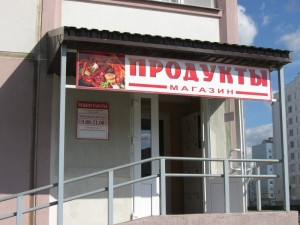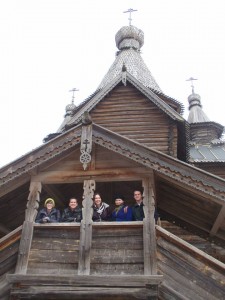1. Language
This is a no-brainer, but I couldn’t leave it off the list! I strongly advise learning at least the alphabet before coming to Russia to avoid feeling completely isolated. While going anywhere where you don’t speak the language can knock you on your butt for a while, Russian is especially difficult with its complex grammar structure (cases, verb aspect, prefixes), unpredictable word stress, and difficult pronunciation (the letters ы, ь, and й always get me)…which also means your successes will be especially triumphant! Effective communication is an essential part of our lives that we often overlook when it comes so naturally, but the first time you can’t answer a cashier’s simple question or can’t properly vent to your host family about your day, you will never underestimate the power of words again.
2. How Emotions are Expressed

Most people are familiar with the stereotype that “Russians don’t smile” (I love this article on the topic). From my observation, Russians tend to not show much emotion outside of the home. Surrounded by strangers, often in inclement weather, there is no reason to emote freely. Of course you see friends laughing and couples kissing and people arguing, but for the most part (excluding driving), emotions stay on the inside. Until you get home…when Russians are comfortable and around people they trust, passions run strong. In the United States, the expression of our emotions tends to vary little in different circumstances, but when expressed, Russian emotions can be even stronger and perhaps even more genuine and heartfelt than Americans are used to.
3. Shopping
Yes, this applies to all genders! Grocery shopping in Russia is not as easy as running to Kroger for all your needs – you often need to go to several places to get everything for a meal. The meat and cheese store, the market for fresh produce, the produkti for drinks… it can seem like a big hassle at first, but it can also be nice to feel more connected to your food overall. Another challenge is not knowing where to go for things. In America, if you need to buy something, you generally know exactly which store to go to – or there will be one store that carries pretty much everything. When you first get to Russia, you likely won’t know where to get anything! There are a few Costco-like supermarkets here, but trips aren’t always convenient. There are also larger “Western-style” supermakets in the city, but those tend to be more expensive and even then, can often be out of stock of a few of the even basic items you might be looking for. For more on shopping difficulties in Russia, click here or here.
4. Using Rubles

Another no-brainer, but make sure you come knowing the exchange rate! It wouldn’t hurt to memorize a few convenient numbers as well: the equivalent of $5, $20, $100, and what locals would expect to pay for products so you don’t get overcharged. Some things are much more expensive in Russia than in America (don’t expect to pay much less than $5 for a coffee or hot chocolate) and some things are cheaper (fresh fruits and vegetables at places like Сенной Рынок/Sennoy Rynok are very affordable!), you just need to get a feel for it. Public buses, trams, trolleys, and marshrutkas have set prices and taxis are (technically) required to have meters in most cities, so don’t worry too much about getting ripped off there. Russia is a much more cash-driven society than America. Many establishments don’t take credit/debit cards, so always have cash handy. Many students who haven’t had much experience using money other than dollars say rubles feel like fake money and end up spending way too much during their first weeks – budget wisely and don’t let that happen to you! This website compares the cost of living in different cities.
5. The Education System
Russian higher education is very different than in the United States. For the most part, universities are buildings scattered throughout a city, not the centralized micro-cities that many US students are used to. University-sponsored extracurricular activities are difficult to find and Russian students rarely live in dorms. Russians generally take 9-11 classes per semester that meet less frequently than American courses would, and it is not uncommon to skip a class almost entirely and just cram for the final from other students’ notes or a study guide. Professors are also less available – no office hours, they don’t always give out a school e-mail address, and in general they treat students more like colleagues. It can be a shock going from a campus plastered with student event flyers to a cluster of cold, half empty, academic buildings, but don’t worry – Russians make up for it by hosting a plethora of clubs and organizations for the city in general. Especially in St. Petersburg and Moscow there are hundreds of clubs to join from language (be a star in the English conversation club; meet other foreigners in Russian club), sports, acting, dancing, singing, board games, movie-watching, and more! Try making some searches on the Russian social network V Kontakte to start out.
6. Balancing Being a Local and a Tourist

There will be plenty of days where you are a tourist – on a group tour of the Hermitage, walking tour of Red Square, bus trip to a suburb – and there will be other days when all you want is to blend in like a local. Constantly seeing your city through a tourist’s eyes is a blessing, a wonderful way to be constantly entertained and fulfilled, especially if you are living in one of the world’s great cities! Of course, after months living in the city, you also want to broadcast to the world that you’re a pro, an expert, and definitely not as green as those backpackers with a giant map snapping 100 pictures in front of the Kremlin…
Especially in Russia where blending in usually entails wearing your emotionless facemask and walking like a model down the catwalk, it can take a toll on your emotional state, exhausting you and breaking down the baby-deer sense of wonder that characterized your honeymoon phase. One of the most crucial aspects of success in Russia is learning to balance these two personas – the wide-eyed tourist and the street-smart local – and learning when to use which one to make the most of your time here.
Going abroad for a long period of time has its difficulties no matter where you choose to go, but the better prepared you are for the challenges you’ll face in Russia, the faster you will adjust and be able to call this northern empire your second home.
HAPPY TRAVELS!


